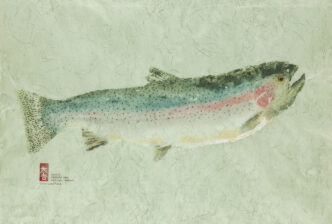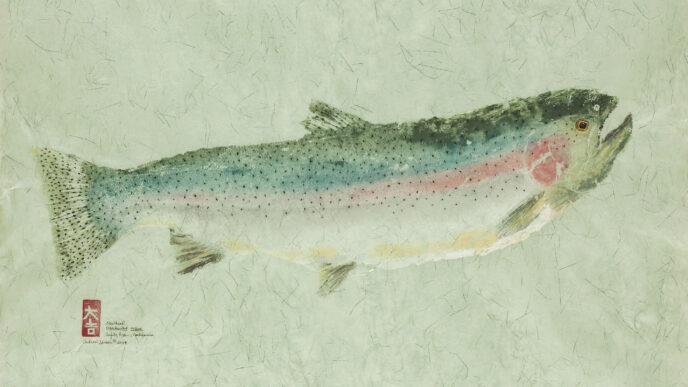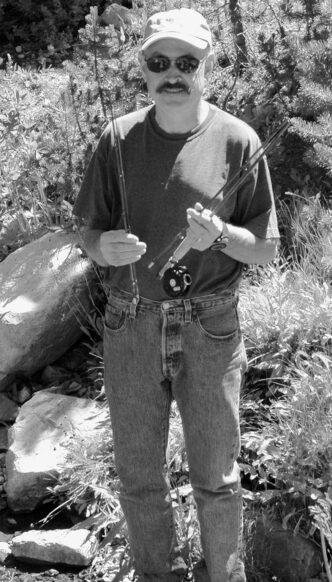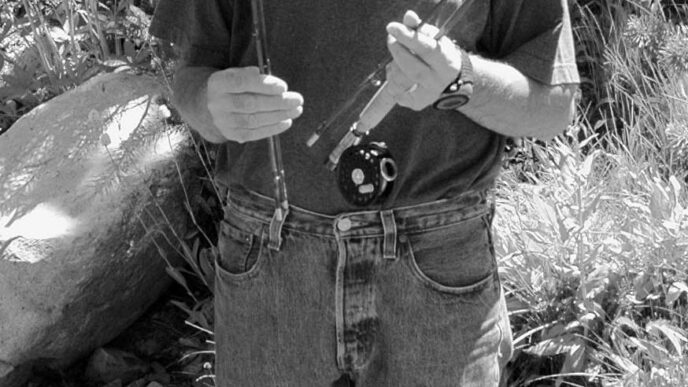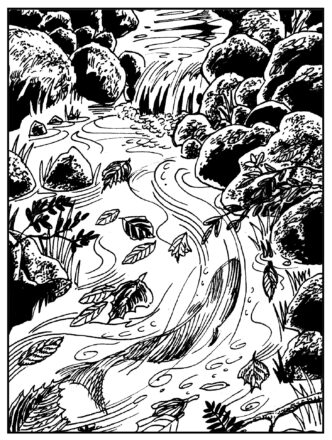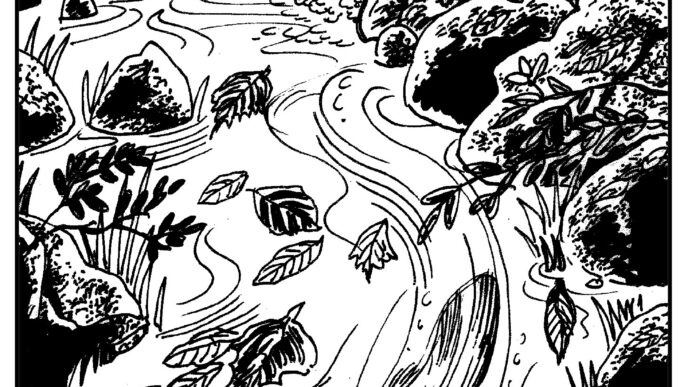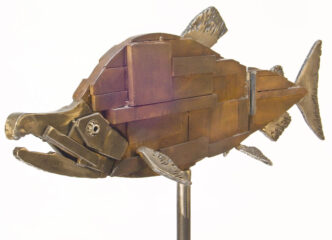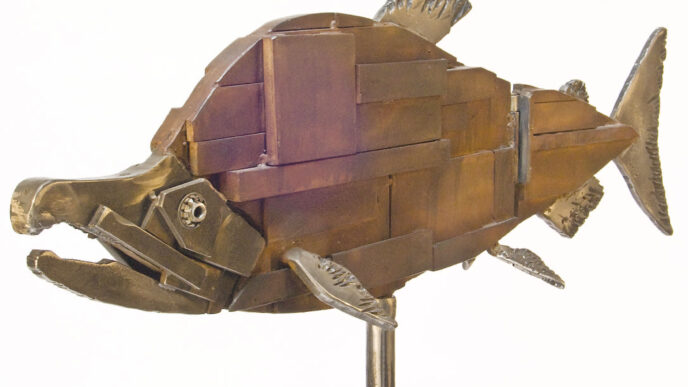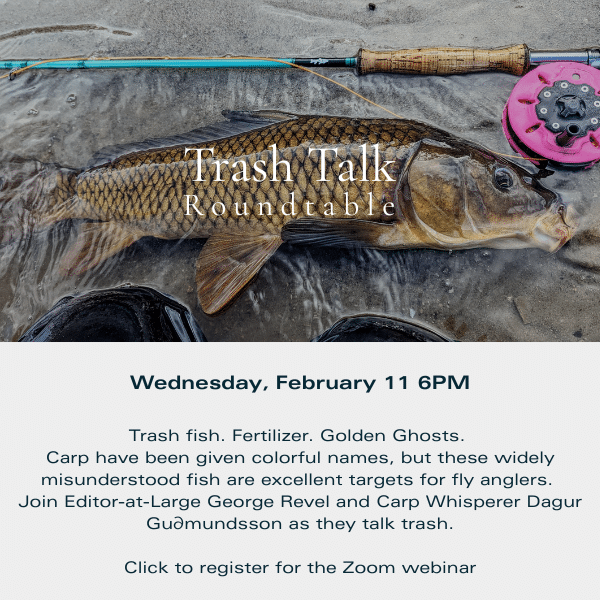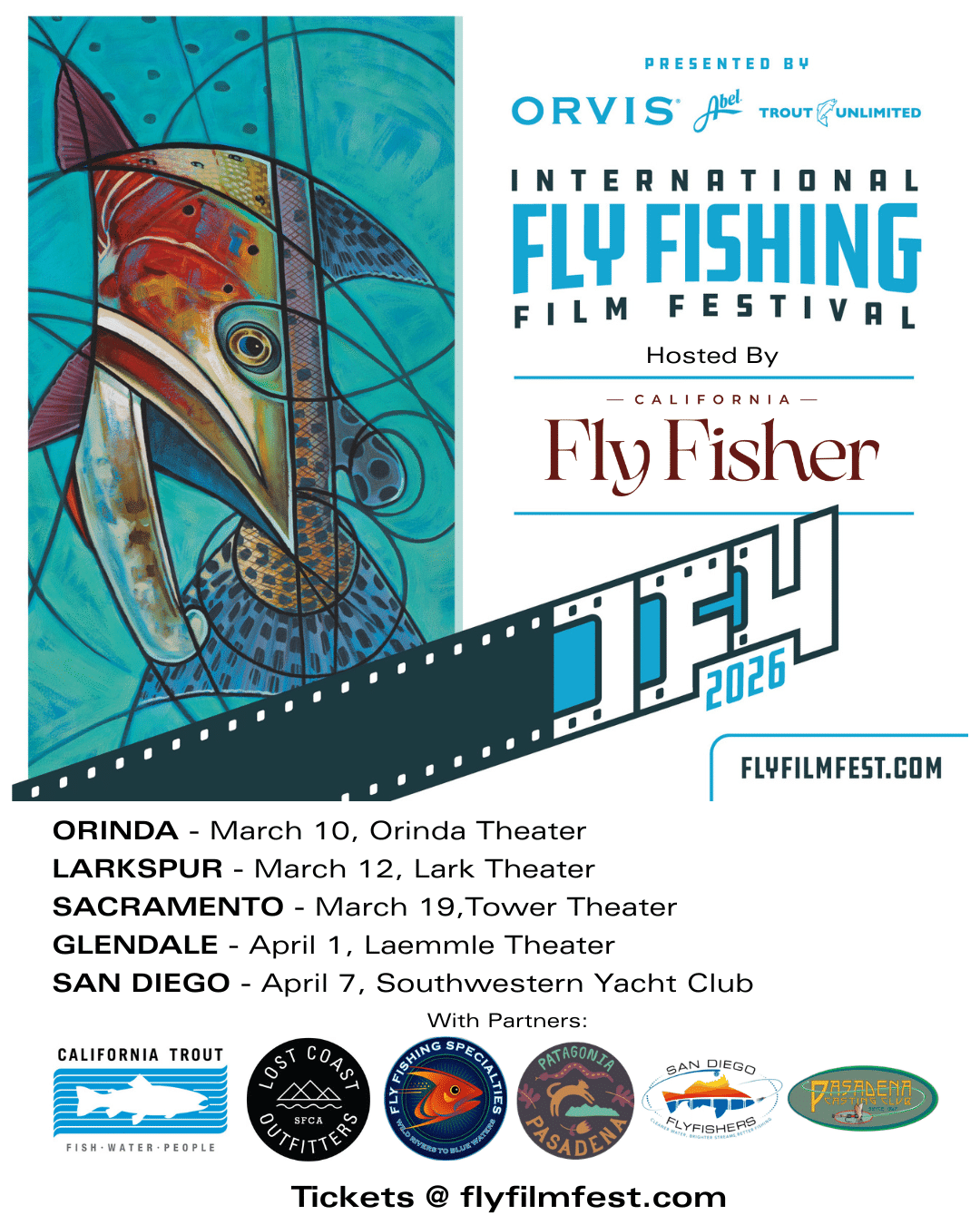Editor’s note: Seth Norman is taking this issue off, and will return with the next issue. In his place, Michael Checchio, author of A Clean, Well-Lighted Stream (Soho Press, 1995), Mist on the River (St. Martin’s Press, 2001), and Being, Nothingness, and Fly Fishing (The Lyons Press, 2001), takes us on a meander into literature and the meaning of angling.
Long before he visited America, the late Ted Hughes, the poet laureate of England, dreamed about our West Coast steelhead. A dedicated salmon fisherman from the British Isles, he considered steelhead “a more intense form of salmon”: “One is susceptible to the legend and the whole mythology of steelhead,” he said, and mythology was what Ted Hughes was all about. He first read about steelhead in the American sporting press, and when financial and artistic success finally got him to our shores, he experienced a truth that we steelhead anglers in California have always known, but sometimes have taken for granted. “Steelhead were just this …you know …God! Steelhead!” The photograph that illustrates the jacket cover on a published collection of Ted Hughes’s letters shows him sitting on a folding chair on the banks of the Dean River in British Columbia, jotting something in a notebook. The dust jacket makes no mention of it, but what Hughes was writing was a poem called “The Bear.” It contains this line: “Metabolism of stars, melt of snows — was shivering to its ecstasy in the steelhead.”
I first saw this photograph when it was used to illustrate a long magazine interview given by the poet that appeared in print shortly after his death from cancer in the autumn of 1998. It was his last interview, one of a rare few ever granted in his lifetime by the notoriously private poet, and it appeared not in a literary journal or a poetry magazine, but in Wild Steelhead & Salmon.
Maybe Hughes figured that the editor of a fishing magazine wasn’t likely to ask him any questions about Sylvia Plath. Their marriage and her suicide were subjects he had avoided talking about for 35 years, at least when it came to any public declarations. Sure enough, the interviewer, Thomas Pero, never brought it up. But to everyone’s astonishment, Hughes spoke about her unbidden. And he talked at length and candidly not only about Plath, but also about his extraordinary obsession with fishing and the primary role of nature in his poetry. It was nothing short of a literary coup for what was after all a fly-fishing magazine. But the poet’s decision to speak up in an angling periodical shouldn’t have come as any great surprise to anyone — at least not anyone who had read his book of poems called River. Alexander Pope famously said: “The proper study of mankind is man.” Hughes could have said it was fish.
When Hughes agreed to be poet laureate back in 1984, it raised a few eyebrows. At the time, he was the most reviled poet since Byron. Flocks of feminists had descended on him, holding him personally responsible for the suicide of their heroine, a justly celebrated American poet whose literary stature has only grown with time. The couple had split up shortly before Plath committed suicide, and what’s worse, Hughes had been unfaithful. His reaction to scandal and controversy was to guard his privacy fiercely and maintain his silence. Yet he seemed to be inviting even more trial by publicity by agreeing to be England’s very public poet laureate.
Some suspected an ulterior motive, one that had nothing to do with the prestige of the title or the many cases of free sherry that came as an honorarium. Hughes knew that the Queen Mother was president of the Salmon and Trout Association and was as mad about salmon fishing as he was. Here was a chance to expand his angling opportunities. Or so goes the conspiracy theory.
It’s a good one, and I like it. As poet laureate, his duties would be minimal and might include only an occasional poem commemorating a national event, such as his first official laureate poem, “RainCharm for the Duchy,” which marked the baptism of Prince Harry. As holy water splashes onto the royal brat’s forehead, Hughes describes in ecstatic wonder how outside the cathedral a rainstorm is bringing a miraculous end to a long national drought, stirring the salmon rivers to a rebirth. Now that’s a christening. The man had fishing on the brain. Case closed.
All joking aside, Hughes’ true motive was far cleverer. His plan was to bring the full weight of the title of poet laureate onto campaigns to save trout and salmon rivers in the British Isles. Critics accused him of cozying up to the establishment by accepting the appointment, but as an environmental campaigner, he raised thorny questions about the Thatcher government’s privatization of water authorities. And in “Rain-Charm for the Duchy” (the full title of which is “A Blessed Devout Drench for the Christening of His Royal Highness Prince Harry”), Hughes in his first draft identified by name each of the rivers in Devon he was fighting to save and slipped into those verses references to their declining health. It caused a stir in Devon local councils.
He also personally entered into a campaign to clean up and restore the River Torridge and was a successful co-plaintiff in a lawsuit against South West Water over pollution in the River Exe. (“Top Poet in Water Fight” ran one headline. Hughes won the case by citing the Magna Carta.) Fighting on behalf of his rivers, tilting at windmills to save the environment, he wrote letters to the editor, lent his name to causes, sat on committees, compiled mountains of evidence to back his claims, and did prodigious scientific research on water problems, testifying at public hearings in a voice that the Guardian described as being as mesmerizing as the one he used at poetry readings.
Hughes was worried that all this time and effort he was putting into environmental causes was keeping him away from his true calling. And he feared he had put off far too long the publication of Birthday Letters, a book-length collection of verses he had been working on in secret for years. These were poems addressed to his late wife, written to Sylvia on each anniversary of her birth. Birthday Letters came out in late 1998, not long before the poet’s death at age 68. In his will, Hughes asked that his name be carved onto a simple block of native granite and raised at a spot where four rivers rise in Devon: the Taw, Dart, East Okement, and Teign. The Guardian reported that this required special permission from Prince Charles and the assistance of an RAF Chinook helicopter, but the marker went up.
Hughes’s fame as a poet, his passion for the outdoors, and his environmental campaigning brought him into contact with many fly fishers, chaps he would later describe to his friend, fellow fly fisherman, and poet Seamus Heaney, as “a huge crop of specialist acquaintances.” Over time, angling opportunities opened for him on four continents, and through his fishing, he met and struck up friendships with such notable fishermen in the British Isles as The Times’s angling correspondent Conrad Voss Bark, the Irish painter Barrie Cooke, and Dermot Wilson, England’s great authority on the dry fly. They seemed to come from all walks of life, this happy band of brothers. There they stood, rods in hand, ecowarriors prepared to save their nation’s rivers and have a little fun in the bargain.
Hughes was a prolific author, but he didn’t write for the sporting pages and fishing magazines — a great pity. Many pressing demands kept the poet away from an anthology of fishing literature that he and a Canadian friend, Ehor Boyanowsky, had been commissioned to edit. (It was Boyanowsky who took the photograph of the poet on the Dean River.) But the poet’s private correspondence was rife with the subject of fishing, and some of what Hughes had to say about his favorite sport and pastime has become available in the first published collection of the poet’s letters. In his introduction to Letters of Ted Hughes, Christopher Reid, who edited the collection, said that although it’s a big book, it represents only a small portion of Hughes’s lifetime correspondence. Most of the letters were written purely for private consumption. This meant that the poet was writing candidly and sometimes unguardedly not only about Sylvia Plath and the torments of poetry and fame, but about the full range of his many passions and deep dislikes. Fortunately, a paramount passion was fishing, so there is a generous amount in this book about the mysteries of rain-blown Irish lakes, sea-trout rivers, and pools full of splashing salmon. One can only hope that another book might be in the offing, one centering on his fishing and his concern for the environment.
Hughes’s obsession with the natural world was a carryover from childhood. By 1957, the year he published his first collection of verse, he was writing to friends and family that he dreamed nightly of fishing. He told his brother, Gerald Hughes, by letter that on the day after one particularly vivid dream involving a monster pike in a lake, he sold his first poem and got married to Sylvia Plath. She, too, was keen on fishing and seemed to him a natural who brought him luck. When he began selling his poems, he used the extra money to buy tackle.
His take on the sport was fascinating. Corresponding with an editor over his book River, Hughes described the art of dry-fly fishing as “a psychologically determined activity — making slight understatements at the surface in the hope of interesting the organic mysteries and terrors in the depth.” He compared strict dry-fly rules governing elite British chalk streams to “class stratification” and, even on an artistic basis, to “typical attitudes to poetic form.” Great fun, he observed, but “an all rounder has to be master of all the methods that produce the goods and the thrill.”
Hughes wrote to Heaney telling him that his fishing had produced a collection of contacts as obsessed about angling as he was. What used to be “an infantile tic” had become an all-consuming game. “Ireland in May, cracking my whip over those obstinate loughs, seems to exhaust it,” he wrote to the Irish poet. “When the season ended yesterday I felt a huge spacious release. But straight away a friend rings me up — a never-to-be-repeated chance to fish the bottom beats of the River Test for two nights, this next weekend, the pools jammed with fish coming in, sea-trout up to twelve pounds, he’s fixed it all up, the sleeping lodge and the lot, 10 [pounds] only a day, can I go, his voice trembling with fever.”
He wrote Dermot Wilson that his three days fishing with the dry-fly master on the Itchen, Test, and Avon, his first experience of Hampshire and Wiltshire chalk streams, made him feel as if he had been “performing in an old English Mystery Play.” He confided to Wilson: “I shan’t ever forget the siege of that fish under the reeds on the far side, that would neither take nor stop rising — with its aides fore & aft to draw the fire.”
To his friend Karl Miller, he recounted an unforgettable fishing trip that the poet had taken to Alaska with his son, Nicholas. “I saw quite a lot, paddled over quite a distance, caught salmon till I was actually sick of catching them (up to 50 lbs), fished alongside bears, woke up among howling wolves — the place put on its full show, completely satisfactory. Immense high wide valleys just floored with flowers — all in brilliant preserving odd light, so the clouds looked like cut lead & everything had an extra dimension of depth and singularity. I just couldn’t believe it.” His son, Nicholas, went on to take a degree in fisheries science and make his home in Alaska, so there were more trips to the land of the midnight sun to fish rivers teeming with salmon. And there were trips to Iceland, Canada, the Hebrides, Ireland, Australia, and Africa, as well.
Hughes’s descriptions of his fishing adventures are vivid and interesting, but more fascinating is what he had to say about the link between the fishing and his writing. Hughes came to think of fishing as a kind of stand-in for poetry. He called it “right brain . . . non-verbal” action. He wrote the poet Anne Stevenson that the ideal place for him to work was as far away from good fishing as possible — “because the whole motive of writing finds perfect and satisfying expression in fishing. Fishing is a substitute symbolic activity that simply short-circuits the need to write.”
But write he did, and the fishing fired his poetic imagination and fed his dreams. His dreams were private myths that he made public in his poems. The most powerful expression of the obsession and the dream emerged in the slim volume of verse simply titled River, published in 1983, the year before he was named poet laureate. The 43 poems in the book are like bait sunk deep into the unconscious. What he brings up from the depths are mythopoeic dramas of men, animals, and fish and the fate they share in a world made sacred by nature’s beauty and violent energies. These are poems full of water and light, tenderness and violence, fear and a resurrecting wonder, an earthly vision enlivened by a profound understanding of all things primal and wild. They are myths to live by.
Reading these poems for the first time is like staring into the bower of Creation. These hymns to man, nature, and animals follow salmon rivers in the British Isles through their annual cycles and seasonal changes. In language that is almost Shakespearean in its resonance and both pagan and Christian in its imagery, the creatures in these poems, like the rivers themselves, take on godlike dimensions. The natural landscapes are breathtaking, but the scenes of river life are unsparing and unsentimental. The poet never shirks from the violence, indifference, and brutal aspects of nature. The natural universe that these creatures inhabit seems both divine and self-torturing, and the gods are preparing the ultimate sacrifice to ensure the ongoing rebirth of the world.
River
Fallen from heaven, lies across The lap of his mother, broken by world.
But water will go on Issuing from heaven
In dumbness uttering spirit brightness
Through its broken mouth.
Scattered in a million pieces and buried Its dry tombs will split, at a sign in the sky,
At a rending of veils.
It will rise, in a time after times,
After swallowing death and the pit It will return stainless
For the delivery of this world. So the river is a god
Knee-deep among reeds, watching men,
Or hung by the heels down the door of a dam
It is a god, and inviolable.
Immortal. And will wash itself of all deaths.
That’s a pietà. The river as the Son of Man broken on the Cross of the World, the body cradled by an earthly mother. Yet no matter how it is sinned against, the river never dies.
And so sunrise shines on “a chrism of birth” anointing the world. The river becomes a “generator” running “the mill of the galaxy.” God glimpses an angler through the eye of a kingfisher. A river at low water appears as a nature goddess, a seductress with “half-dreams” lifting out of her like “suicide love-pacts.” On the night when sea trout arrive, a horned god runs and leaps in the corn “with a bat in its drum.” A salmon river full of cock minnows in springtime is “in a resurrection fever.” And everywhere there are the salmon, the primary force of Eros and the source of wisdom and immortality in Celtic mythology. In their sexual energy, in their epic return and renewal in the river, in their elusiveness and grace — and in that leap that is like the leap of inspiration itself — salmon stand for the very source of life.
An “August Salmon” is “a god on earth for the first time / with the clock of love and death in its body.” A “September Salmon” passes into immortality, becoming “a tree of sexual death, sacred with lichens.” Even the water skeeters playing on the surface are “god-like.” In “Strangers,” sea trout drop anchor in the mouth of a river and stare up like mystics at the sun.
The sea-trout, upstaring, in trance,
Absorb everything and forget it
Into a blank of bliss.
And this is the real samadhi — worldless, levitated.
And then a fisherman wades too close and “the holy ones shrink their auras” and “scram like trout.” The ritual act of fishing becomes a shamanic journey for the angler: Join the river in wordlessness, lose yourself in the elements, and then slowly come back, “heal into time and other people.” An old man, a living relic (“He’s a trophy of the Great Days”) casts for salmon on an empty river, and “now the heavens fail.” The sequence of poems even opens with a modern fertility ritual: the milking of salmon eggs and milt. The river suffers along with the patient in a cesarean birth. A dying salmon sinks into her “trough of coma.” But under the gravel, her eggs are ticking with life.
In the finest poem in the sequence, “October Salmon,” the human journey is mirrored in the odyssey of a single fish. Here is language at its most charged and assonant. A male salmon awaits his fate in a graveyard pool. He is, in Hughes’s description, a “mere hull of his prime.” What the poet describes as “the sea-going Aurora Borealis of his April power” is but a memory. The strength that once carried him on “that first uplifting in the estuary” fails him. “That is what the splendor of the sea has come down to.” “So briefly he roamed the gallery of marvels!” Once he tasted “the salt mouthful of actual existence.” Once he looked at the world through an “eye of ravenous joy.” Now he is “a shroud in a gutter.” “How quickly it’s over!” And “this chamber of horrors” is his home. “If boys see him they will try to kill him.” His fate was “inscribed in his egg.” How “patient” he is “in the machinery of Heaven.” Ted Hughes began publishing at a time when poets had decided they were no longer required to write masterpieces. Poetry in the postwar era was to be understated, domestic in subject matter, mildly ironic. Hughes never got the memo. His poems journeyed all the way back into the mists of time and to the bardic traditions of the British Isles. It’s true that he had more harebrained beliefs and crackpot ideas than any great poet since William Butler Yeats. (Like Yeats, he believed in astrology.) But at the time of his death he had become, justifiably, one of the most famous poets in the world. Starting with the seminal Hawk in the Rain, his 40-odd books of poetry and prose give us a world consumed by the ecstasies of nature. They are unsparing in their beauty, helplessness, and hungry joy. He lived in a shaman’s universe. He lived in awe. The poems in River are the finest ever written on the splendor and mystery of moving water and on our primal need to connect to those wild places where great fish and even greater ideas dwell. As Ted Hughes once said in a poem, to the surprise of no one: “Mankind is many rivers that only want to run.”
Books Referenced:
Letters of Ted Hughes, selected and edited by Christopher Reid. Published by Farrar, Straus and Giroux, 2008.
River, By Ted Hughes. Published by Harper and Row, 1983.



